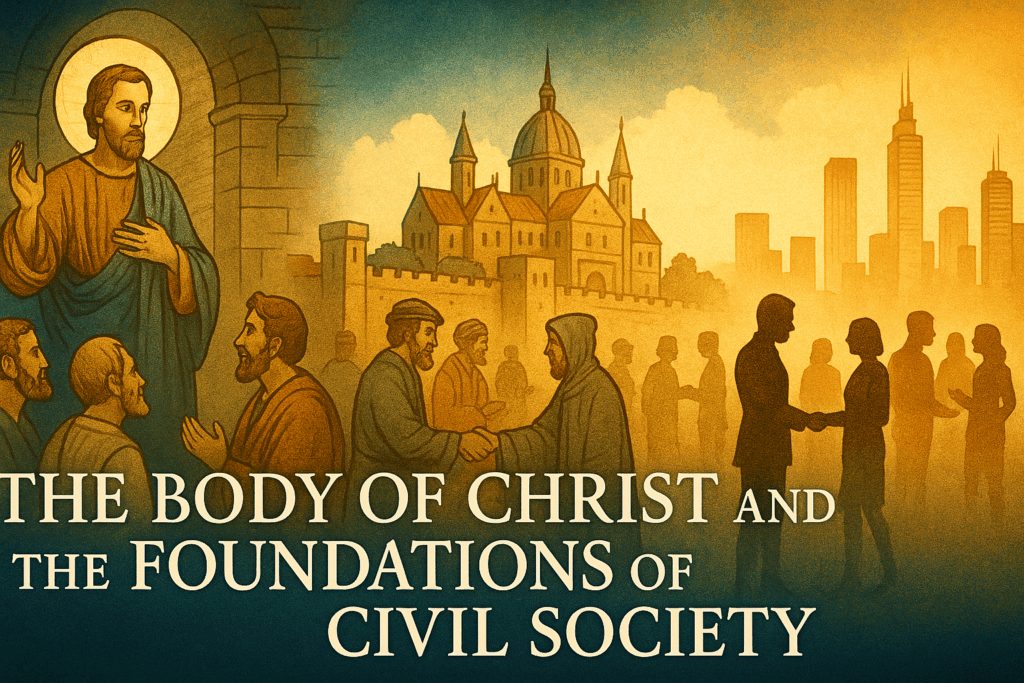Among Paul’s most enduring metaphors is that of the church as a body, where every member has value and purpose. Far from being merely a theological image, this paradigm has reverberated through Western civilization, shaping how communities understand diversity, interdependence, and mutual responsibility. Paul’s vision laid the groundwork for a society that honors the dignity of each individual while affirming the necessity of collective unity. Modern social ethics—whether in politics, economics, or civic life—are deeply indebted to this Pauline paradigm.

The Scriptural Witness
Paul begins in 1 Corinthians 12:14 with a simple yet profound statement: “For the body is not one member, but many.” This foundational insight emphasizes that the community cannot be reduced to a single part or perspective. Each member has a role, and together they form a greater whole. The metaphor challenges both individualism that isolates and collectivism that erases uniqueness. Instead, it envisions a harmony where diversity is essential to the flourishing of the whole.
Expanding on this, 1 Corinthians 12:21 insists: “And the eye cannot say unto the hand, I have no need of thee: nor again the head to the feet, I have no need of you.” Here Paul repudiates superiority within the body. No role, however prominent, can dismiss the necessity of another. This strikes at the root of social hierarchies and elitism, affirming that value is not measured by visibility or prestige but by indispensable contribution. The same principle informs modern labor rights, democratic representation, and inclusive social policies.
Paul continues in 1 Corinthians 12:26: “And whether one member suffer, all the members suffer with it; or one member be honoured, all the members rejoice with it.” This verse highlights empathy and solidarity. The health of the body depends on shared concern and mutual care. The suffering of one diminishes all; the flourishing of one enriches all. This ethic of shared fate remains central to modern ideals of social justice, welfare, and community solidarity.
Finally, Ephesians 4:15–16 describes the organic growth of the body: “But speaking the truth in love, may grow up into him in all things, which is the head, even Christ: from whom the whole body fitly joined together and compacted by that which every joint supplieth… maketh increase of the body unto the edifying of itself in love.” The body grows not through domination but through cooperation, each part contributing to the whole. Paul envisions a community where growth is mutual, relational, and sustained by love. This vision anticipates the modern principle of subsidiarity, where institutions and communities thrive when each part contributes according to its capacity.
The Pauline Paradigm and Modern Ethics
Paul’s body metaphor does more than describe the church—it introduces a model of social order that would echo through centuries. The idea that each person, regardless of station, is indispensable to the community inspired the development of democratic ideals, where every voice counts. The insistence that the suffering of one affects all resonates with the modern social contract, where the well-being of individuals and the health of society are inseparably linked.
Moreover, the Pauline vision undermines the logic of domination. Elites cannot dismiss the contributions of the weak, just as the head cannot reject the feet. This principle fueled later critiques of slavery, aristocracy, and exploitative labor systems. Modern movements for equality and solidarity find their roots in Paul’s conviction that all members of the body must be honored.
Equally significant is Paul’s emphasis on growth through cooperation. In an age that prizes competition, Paul’s paradigm reminds us that true flourishing is communal, not individualistic. The strength of a society is measured not by its most successful members but by the health of the whole body.
Why It Matters Today
The metaphor of the body remains as urgent now as it was in Paul’s day. In a fragmented world marked by polarization and division, the reminder that “the body is not one member, but many” is a call to recover unity without erasing diversity. It challenges societies to honor the contributions of all—whether visible or hidden, powerful or vulnerable.
Modern secular ethics—such as human rights, social welfare, and participatory democracy—owe their shape to this Pauline vision. The idea that the flourishing of one depends on the flourishing of all is not a secular invention but a Christian inheritance. To neglect these roots is to forget why we prize solidarity, empathy, and inclusion in the first place.
Paul’s paradigm of the body calls us to remember that no one can say to another, “I have no need of you.” In affirming the indispensable worth of every member, Paul gave the world a moral vision that continues to undergird the best of modern civilization. Our task today is to preserve and deepen this inheritance, ensuring that the body we call society grows together in love.
Memorize The Scriptures And Doctrines From This Pauline Paradigm Here
